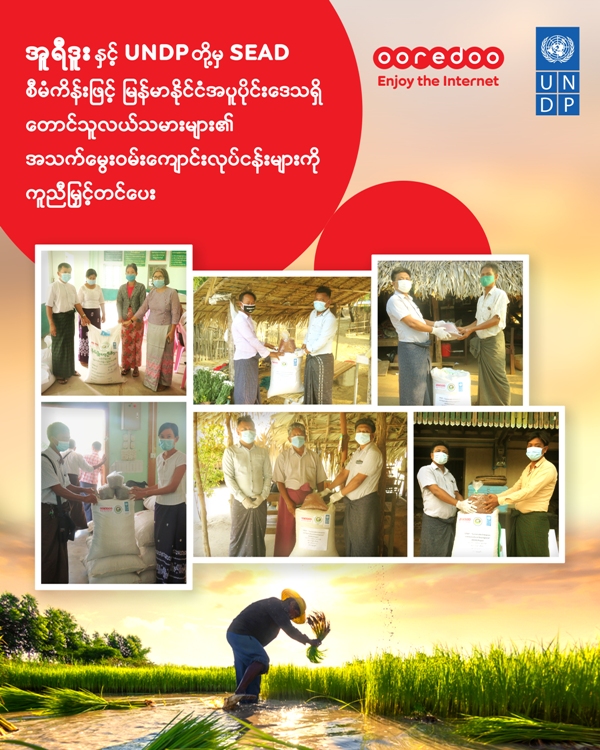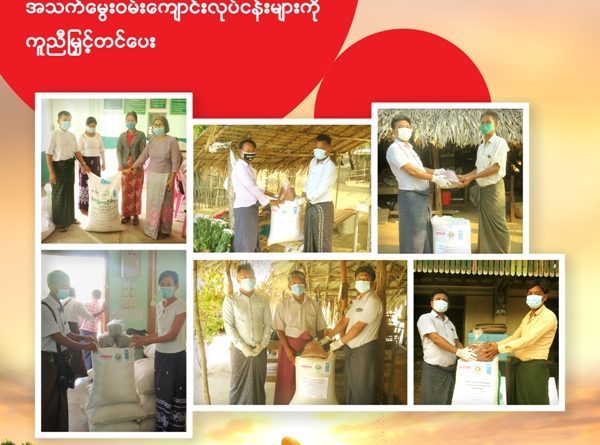Leveraging digital technology to support farmers in building resilient agricultural food systems and responding to COVID-19 in the Dry Zone
Ooredoo Myanmar and the United Nations Development Programme (UNDP) in collaboration with Ministry of Agriculture, Livestock, and Irrigation (MOALI) have implemented a project encouraging climate-resilient agriculture practices, food processing and strengthening market linkages for increased incomes to support farmers in responding to COVID-19 response in Myanmar’s Mandalay Region.
The 15-month-long Sustainable Enterprises and Agricultural Development (SEAD) Project will provide high-quality seeds and product demonstrations to vulnerable farming communities in the central dry zone amid the COVID-19 pandemic.
As a part of the initial support, quality climate-resilient seeds were distributed to 40 field demonstration plots in Myingyan and Nyaung U townships in Mandalay Region, which will serve as farmer field schools for farmers, setting the foundation of stronger income diversification and more resilient livelihoods.
Farmers will be able to gain climate-resilient farming experience throughout the season while benefitting a package of virtual services comprising good agricultural practices, good livestock husbandry practices, timely weather forecasts by respective government department and training materials will be disseminated through webinars, podcasts, and short demonstration videos via YouTube and social media channels.  Photo Source https://www.facebook.com/OoredooMyanmar
Photo Source https://www.facebook.com/OoredooMyanmar
“Many sectors are significantly affected by the global pandemic COVID-19, including the agricultural sector. It is crucial for us as a leading telecom operator to provide an opportunity to enhance the livelihood of the farmers who are the backbone of our country. During this difficult time, we believe mobile technology can be a solution for farmers to have better access to technical information for sustainable farming,” said U Tint Naing Htut, Head of Corporate Communications for Ooredoo Myanmar.
Under the SEAD project based on a needs assessment to understand the impact of COVID-19 on farmers, tailored virtual climate advisory services, and sustainable agricultural and livestock breeding practices in partnership with key government counterparts will be provided in partnership with Department of Agriculture (DOA), Department of Agricultural Research (DAR) and Livestock Breeding and Veterinary Department (LBVD).
Additionally, the project will help match supply with the demand for sustainable farming. It will also add value in the agriculture and livestock sectors and connect farmers to markets as well as credit through the use of mobile money.
The project will benefit 130 villages in Myingyan and Nyaung U townships, boosting the livelihoods of farmers. But it will also promote equality and inclusiveness.
At least 30% of women farmers will be engaged in community agricultural groups and livestock groups. These groups will participate in farmer field school mechanisms integrated with ICT technology.  Photo Source https://www.facebook.com/OoredooMyanmar
Photo Source https://www.facebook.com/OoredooMyanmar
Speaking about the project, Dawn Del Rio, Officer-in-Charge and Deputy Resident Representative of UNDP Myanmar said, “We are pleased to strengthen agricultural extension services by building capacities of relevant government departments and farmers to leverage mobile communication technologies for outreach and dissemination through demonstrations and farmer field schools. This pilot initiative will provide timely and reliable information to rural farmers leading to improved farming productivity, resilience, food security, and rural development to respond to the COVID-19 crisis.”
The next step will see key farmers trained on the “Training for Trainers (TOT)” program to share their knowledge with other farmers in their villages. This will enhance their decision-making capacity in their farming in order to build up sustainable agricultural practices amid a changing environment.
Farmer field school approaches will also be carried out, and the lessons will be prepared and packaged as part of virtual platforms in the form of an application, developed by the SEAD project in collaboration with the government and social media sites for the benefit of the farmers.






